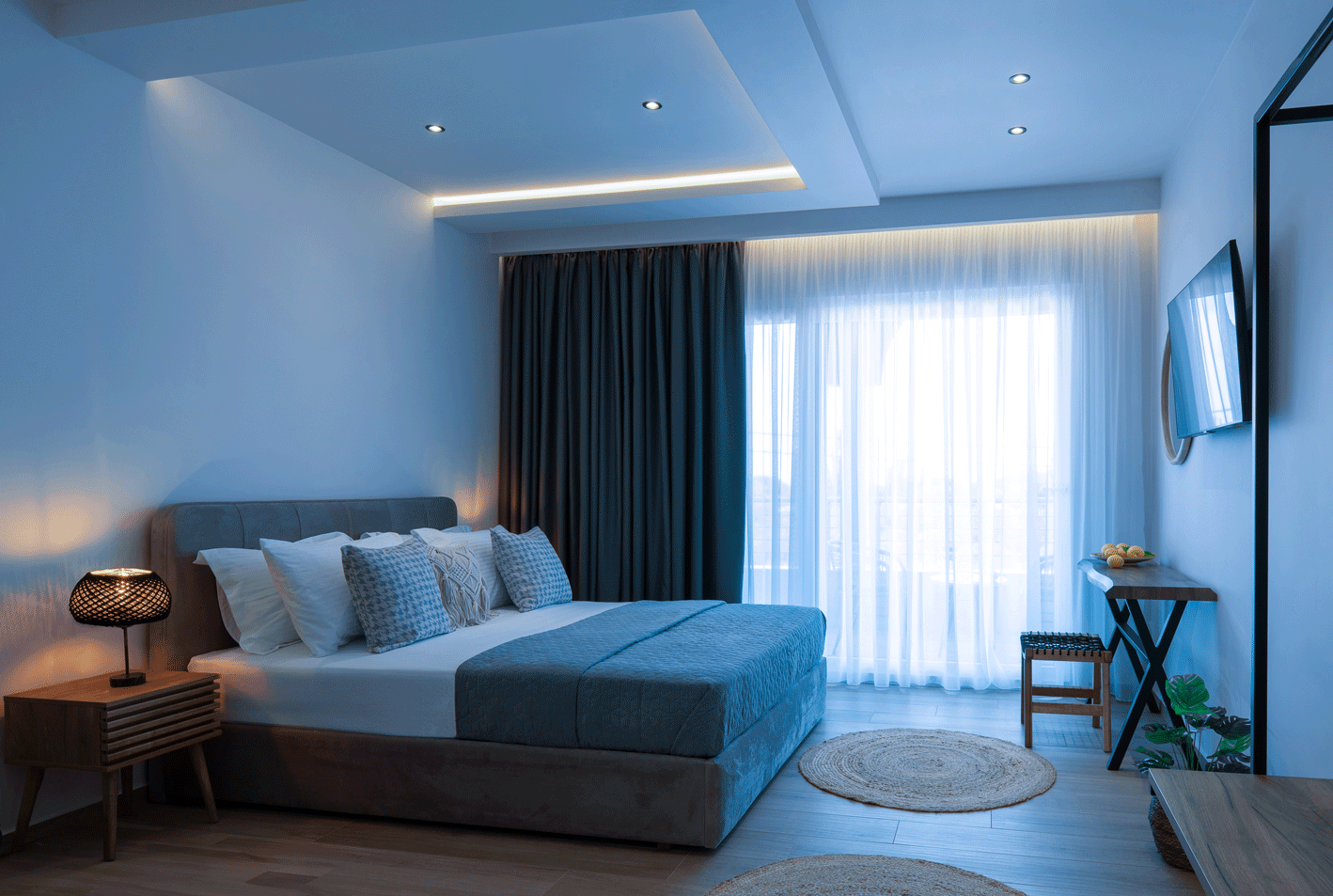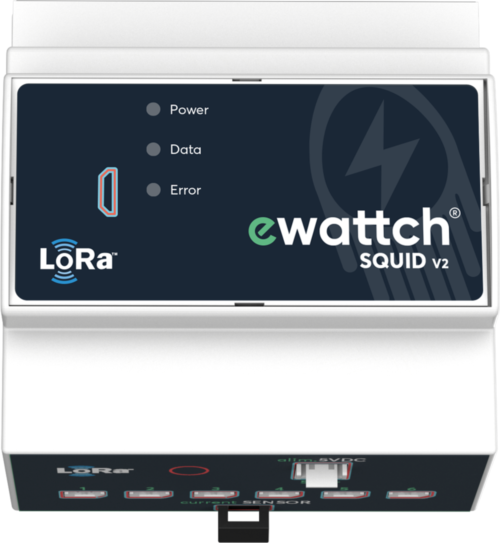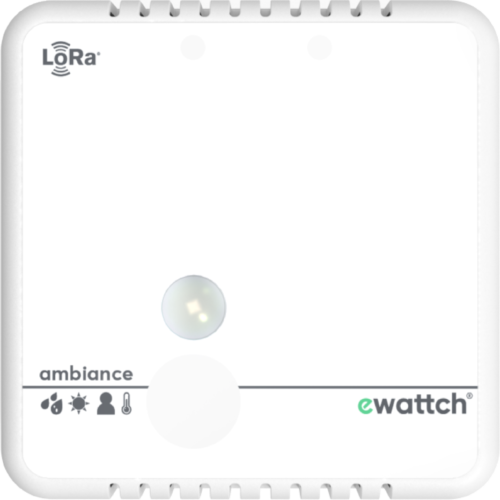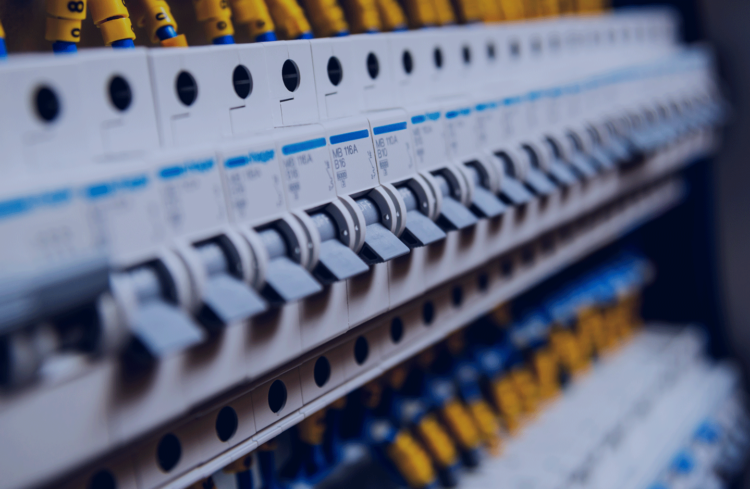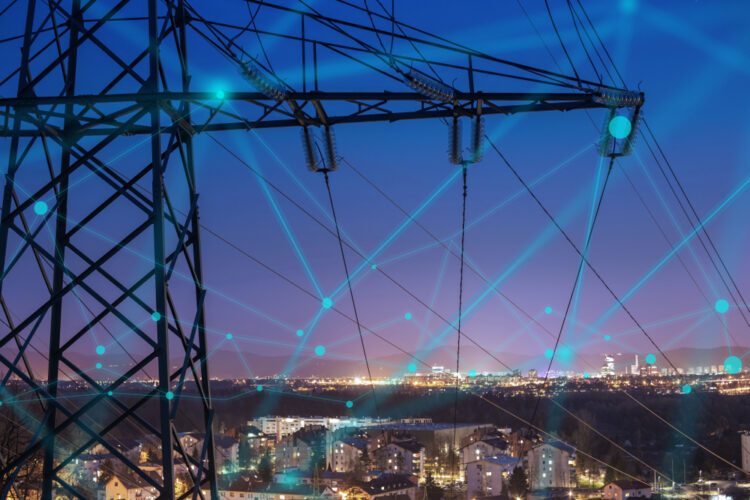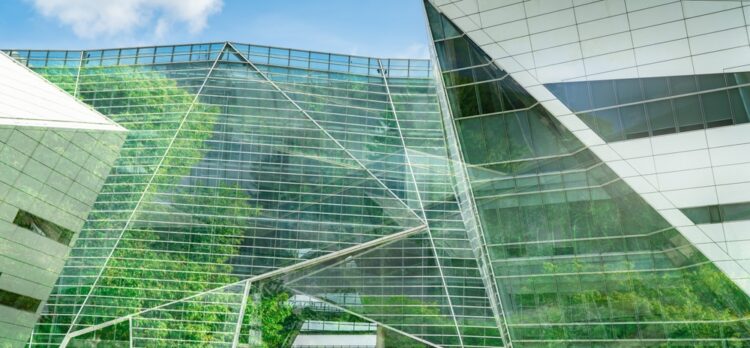Evolving traveler expectations are forcing thehotel industry to rethink its business model. Today, the quest for more sustainable accommodation no longer only concerns a niche of committed customers: it is becoming a central criterion of choice for a growing proportion of the clientele. In France and elsewhere, hotels are adapting to this new situation by integrating environmentally-friendly practices. In this transition to a more sustainable hotel industry, energy management is a key lever. So how do you go about transforming your establishment into a truly eco-responsible hotel?
Why optimize your hotel's energy management?
What is an eco-responsible hotel?
An eco-responsible hotel is one that adopts practices aimed at reducing its environmental impact, without compromising on the comfort offered to its guests. This approach is based first and foremost on optimizing energy consumption, by ensuring efficient management of the building's equipment and resources. It also involves a significant reduction in waste and wastage, promoting recycling and sustainable alternatives. The use of local and renewable resources is another essential pillar, contributing to a reduced ecological footprint and enhancing the value of the region. Finally, a hotel committed to this transition adopts a proactive approach to eco-tourism, integrating environmentally-friendly initiatives and encouraging more virtuous practices.
Hotels that adopt this approach can rely on environmental labels and certifications to structure their approach and guarantee their commitment. These include :
- Cléf Verte the best-known label in France, requiring sustainable practices and consumption monitoring
- European Ecolabel awarded to hotels with a reduced ecological footprint throughout the life cycle of their services.
- Green Globe certification for establishments committed to sustainable development.
The benefits of energy efficiency
Energy optimization is no longer just a question ofenvironmental ethics for hoteliers, it is above all a strategic decision that directly impacts the profitability and attractiveness of an establishment. At a time when energy costs are soaring and regulations are tightening, hotels that anticipate these challenges by rethinking their energy consumption are positioning themselves as major players in tomorrow's hotel industry.
- Reduced energy costs: better management means lower consumption and therefore substantial savings.
- Reducing carbon footprint: improving energy efficiency helps to control the environmental impact of our establishments, in line with the expectations of customers attracted by more environmentally-friendly tourism.
- Complying with regulations and obtaining labels: environmental standards are becoming increasingly stringent. Optimized management is a lever for regulatory compliance to meet the sector's legal requirements.
- Improved customer comfort: intelligent management of room temperature, air quality and appropriate lighting provide an experiential asset for occupants.
- Enhancing brand image and building customer loyalty: a responsible hotel attracts a committed clientele, and paves the way for marketing based on a differentiating positioning.
What are the main sources of energy consumption in a hotel?
Thehotel industry is an energy-intensive sector, with average electricity consumption of 241 kWh/m2/year (ADEME 2023). Between heating, ventilation, air conditioning, lighting, hot water production and kitchen and laundry equipment, each consumption item has a significant impact on operating costs.
HVAC (Heating, Ventilation, Air Conditioning) generally accounts for the lion's share of a hotel's energy consumption. Poor insulation, outdated equipment and inefficient management can lead to over-consumption, and therefore unnecessarily high costs.
Lighting is also a key factor, especially in common areas and bedrooms. The use of energy-guzzling light bulbs or continuous lighting is a heavy burden on electricity bills.
Finally, the domestic hot water productionessential for customer comfort, requires optimized management. Showers, spas, swimming pools, kitchens and laundries are all areas where hot water is used intensively, increasing energy demand.
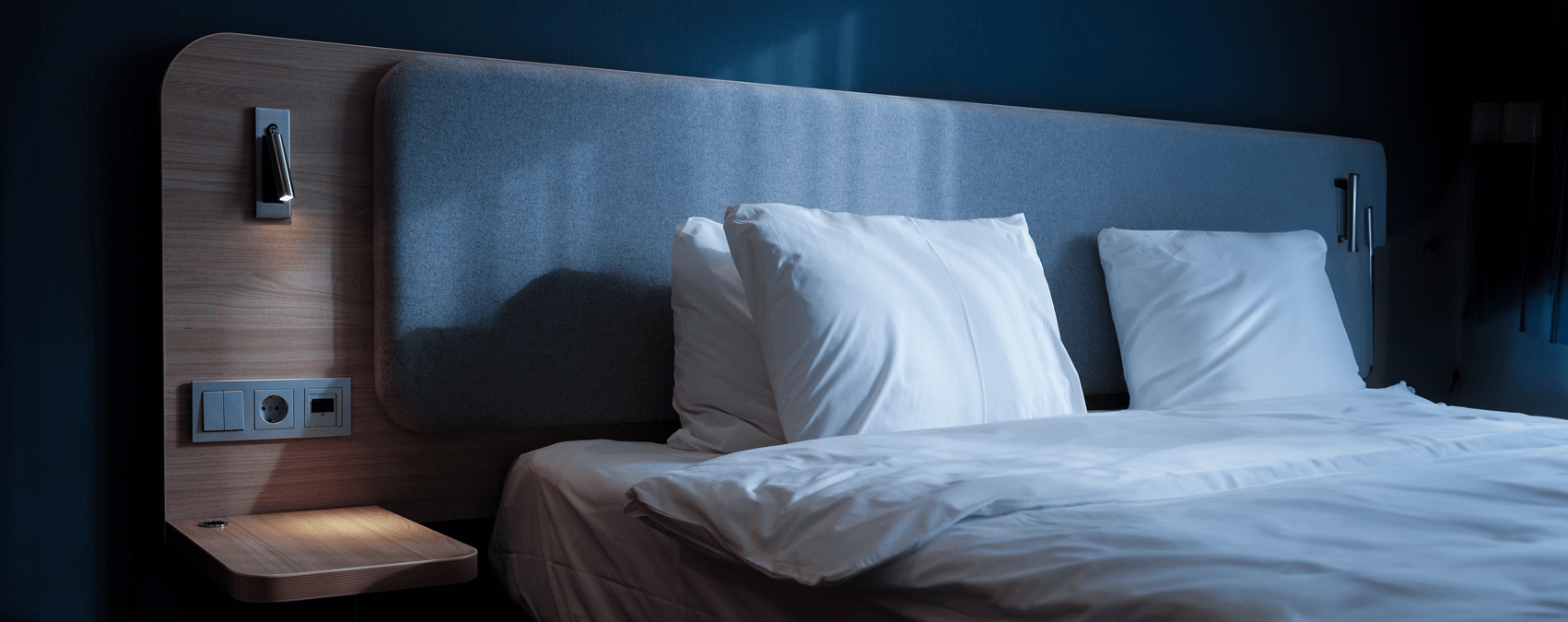
Energy solutions for an eco-responsible hotel
Focus on renewable energies
Investing in renewable energies is an effective way of reducing dependence on fossil fuels while keeping costs under control over the long term.
Installing solar thermal or photovoltaic panels can supply all or part of your hot water and electricity needs, with a rapid return on investment and the possibility of selling surplus energy to generate additional income.
It's also worth looking into alternative solutions, such as geothermal energy or heat pumps, which offer optimum energy efficiency. Some opt for green electricity contracts, guaranteeing that the energy consumed comes from renewable sources.
Optimize lighting and electrical equipment
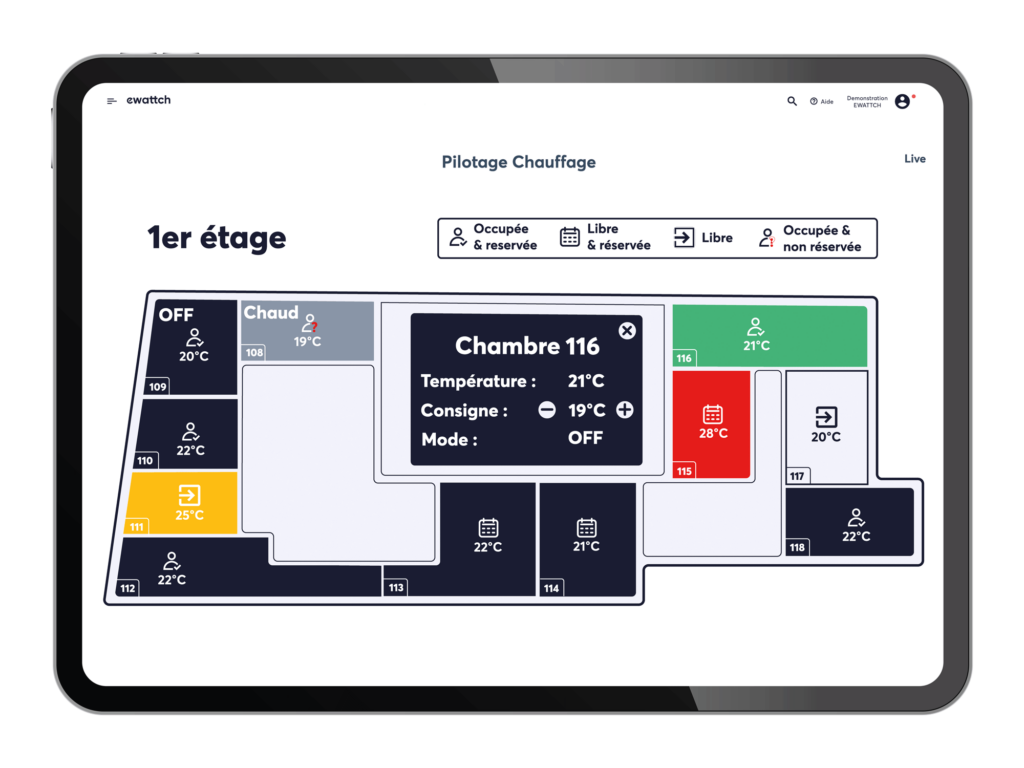
Lighting, with its constant presence in corridors, halls and rooms, accounts for a significant proportion of a hotel's energy consumption. Behind the simple question of the light bulb switched on unnecessarily, there's a whole issue of rational energy use at stake, with economic and environmental stakes of the highest order. Replacing conventional light bulbs with low-energy LEDs is now the obvious choice, drastically reducing costs while improving equipment life.
But beyond simply changing bulbs,artificial intelligence and automation now offer more sophisticated solutions. The installation of presence detectors, which adjust light intensity according to the number of people passing through, eliminates wastage in little-used common areas, while centralized management systems offer precise programming according to occupancy times and actual needs.
Even more sophisticated, centralized management allows room lighting and temperature to be adjusted according to occupancy: no need to light an empty room or air-condition an unoccupied one. An approach that combines savings with service modernization.
Improve heating and air conditioning
Long considered fixed equipment, heating and air conditioning are now becoming adjustable variables, thanks to technological advances. Intelligent, programmable thermostats allow temperatures to be adjusted according to occupancy, thus avoiding wastage. Centralized control gives managers a precise view of real needs, reducing overconsumption without compromising customer comfort.
Thermal insulation also plays a fundamental role. A poorly insulated building lets heat escape in winter and coolness in summer, forcing HVAC systems to constantly compensate. Investing in better insulation for rooms and communal areas can help reduce energy bills over the long term, while improving the customer experience. Last but not least, preventive maintenance ensures that equipment operates smoothly and extends its lifespan, avoiding costly breakdowns and unnecessary overconsumption.
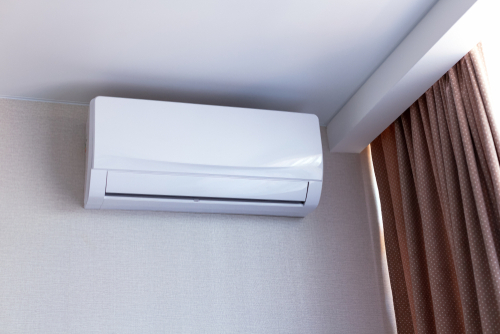
Reduce water and water heating energy consumption
Water is a precious resource, but heating it also represents a significant proportion of a hotel's energy consumption. Every shower, every bath, every dripping faucet results in invisible but very real energy expenditure. Installing flow restrictors on taps and showers can reduce water consumption without compromising user comfort.
In addition, connected monitoring systems make it possible to track water consumption in different areas of the hotel in real time, detect leaks and optimize water heating according to actual needs. In particular, these intelligent sensors can identify periods of high consumption and adjust hot water production to avoid unnecessary excesses.
In some establishments, heat recovery is becoming an innovative solution: wastewater heat recovery systems make it possible to harness the energy already used to heat new quantities of water, thus reducing the overall energy bill. Finally, customer awareness plays a key role. Simple initiatives, such as towel and bed linen reuse programs, help to limit the number of washes, thus reducing water and energy consumption linked to laundry operations.
Combined, these solutions offer dynamic, optimized water management, reducing both consumption and theenvironmental impact of the facility.
Equip yourself with an intelligent energy management platform
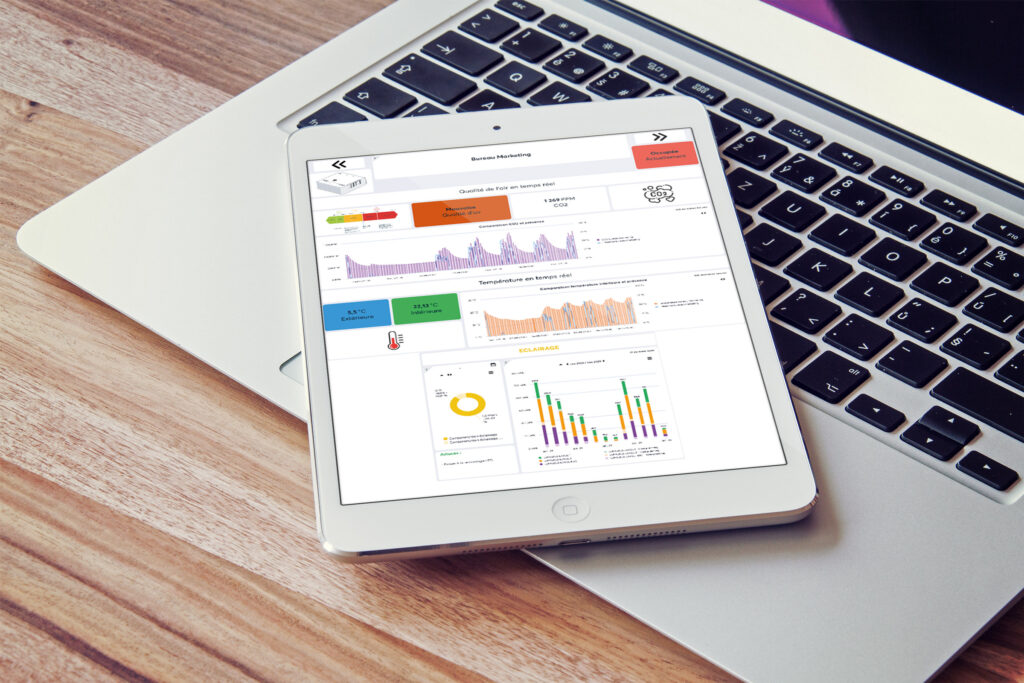
Eco-hotels are no longer content to optimize their equipment on an ad hoc basis; they operate on a dynamic, predictive management model. Thanks to energy management platforms, it is now possible to monitor consumption trends in real time,identify drifts, detect waste and receive automatic alerts in the event of abnormal over-consumption.
Data analysis allows us to go even further, adjusting consumption according to peak periods, weather conditions or customer behavior. With these tools, every hotelier has a precise energy map, enabling them to anticipate their needs and make informed decisions.
Ewattch, a specialist in connected energy management, supports establishments in this transition by offering intuitive, high-performance solutions. Thanks to its sensors and monitoring platform, hoteliers can at last control their consumption with precision, and make their business more sustainable and profitable.
How to finance the energy transition of an eco-responsible hotel?
Contrary to popular belief, reducing a hotel's energy consumption does not necessarily require heavy investment. Many actions can be implemented gradually, with rapid returns on investment, sometimes in just a few months. The key lies in a targeted optimization strategy, where every euro invested immediately translates into savings on operating costs. Simple solutions exist to finance this transition:
- Focus on low-cost, high-impact actions: install smart sensors to monitor consumption in real time, replace energy-hungry light bulbs with LEDs, or automate lighting and temperature according to room occupancy.
- Take advantage of available grants and subsidies: Numerous public and private schemes exist to support investments in energy efficiency, including subsidies for sustainable hotels, energy renovation grants and tax incentives for efficient equipment.
- Adopt a step-by-step approach: Rather than embarking on a massive project, energy optimization can be carried out in stages, starting with the most energy-intensive items, such as heating and lighting, before integrating more advanced technologies.
- Rely on the profitability of energy savings: Reducing wastage can itself finance part of the investment. By precisely identifying points of over-consumption through optimized management, the savings generated can be reinvested in new improvements.
- Exploiting performance-based models: Some solutions allow you to benefit from savings-based financing, thus limiting the impact on the hotel's cash flow.
A well-thought-out energy transition is not simply a cost, but a strategic investment that improves both the hotel's profitability and its environmental footprint. By integrating intelligent management tools and adopting a progressive approach, every establishment can transform its energy consumption into a sustainable competitive advantage.
Discuss your project with an expert
Turn your establishment into an eco-responsible hotel
Optimizing a hotel's energy management means choosing a more sustainable, profitable and attractive hotel business. By reducing their consumption and relying on renewable energies, establishments can reduce their environmental impact while improving their brand image and profitability. The future of the hotel industry lies in innovation and commitment. It's time to adopt best practices and make your hotel a player in sustainable tourism.

